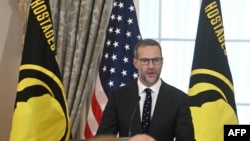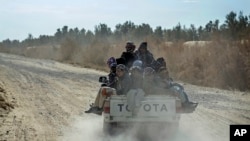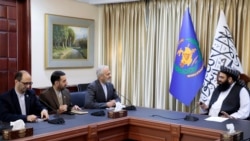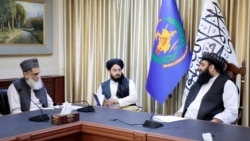
The U.S. State Department held a flag-raising ceremony on Thursday for hostages and wrongful detainees, reaffirming the U.S. government's commitment to securing the return of American citizens and lawful permanent residents detained abroad.
“Our policies are 100% focused on returning people home,” said Adam Boehler, President Donald Trump’s special envoy for hostages. He added, “You'll see some announcements in the coming days,” without providing further details.
“President Trump is committed to bringing home all Americans held hostage or wrongfully detained overseas. This includes the Americans and all other hostages that Hamas is still holding hostage in Gaza,” a State Department spokesperson told VOA.
“Efforts to bring them home are ongoing and sensitive – we do not have any meetings to announce or readout at this time,” the spokesperson said.
March 9 marks 18 years since former FBI agent Robert Levinson was abducted in Iran.
In recognition of this, Congress, with bipartisan support, designated the Hostage and Wrongful Detainee Flag in the National Defense Authorization Act for Fiscal Year 2024.
On Thursday, FBI Director Kash Patel said Washington is determined to "zero out" hostage cases and wrongful detentions, as well as repatriating the remains of those who could not be brought home, through diplomatic and intelligence efforts.
The ceremony came a day after Trump welcomed eight former hostages who had been held by U.S.-designated terror group Hamas to the White House.
On Wednesday, the White House also confirmed that U.S. officials have engaged in ongoing discussions with Hamas. The talks, held in Doha, Qatar, mark the first known direct engagement between the United States and Hamas since the State Department designated the group as a foreign terrorist organization in 1997.
Boehler led the direct talks with Hamas, which were reportedly focused on securing the release of U.S. hostages and exploring a potential end of the war without Hamas in power in Gaza.
Among the hostages still held by Hamas, five are U.S. citizens, including 21-year-old Edan Alexander, who is believed to be the last American-Israeli hostage still alive in Gaza.
His mother, Yael Alexander, recently spoke at Hostages Square in Tel Aviv. “This is the simple truth: The situation with the hostages becomes more urgent every day,” she said.
“They are working on Phase 2 now. We don’t see it as a phase — we see it as the way to bring our son home. It doesn’t matter what you call it; what matters is that there is an agreement to bring the remaining hostages home as soon as possible,” she said.
This week, Israeli officials said that Israel is ready to move forward with the second phase of a Gaza ceasefire deal, provided Hamas agrees to release more of the 59 hostages it is still holding.
Some information was provided by The Associated Press and Reuters.











